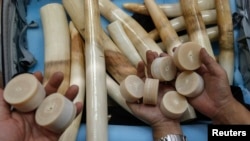Some 200 tusks from elephants slain in Cameroon and Gabon have been intercepted at the Yaounde-Nsimalen International Airport. They were bound for Asia - where a high demand for ivory has sparked the illegal slaughter of elephants in Africa. Conservationists say almost 12,000 elephants have been killed in Central African countries since 2004.
Cameroon authorities said the tusks came from the southern part of the country near the border with Gabon where elephant poaching has been rife.
More than 94 elephants slaughtered
Wildlife official Issola Dipanda supervised the operation to seize the tusks at the airport after a tip-off from locals. He told VOA that although the poachers escaped, all efforts are being made to find them.
He said at least 94 elephants of all ages were killed in this particular incident. He said they have secured the tusks and will track down those responsible for these crimes against endangered wildlife.
Gabon, Cameroon, the Democratic Republic of Congo are home to more than half of Africa's forest elephants - the smallest of the African species. Their tusks are highly valued for jewelery and other ivory products in Asian markets because of the quality of their tusks.
Possible extinction, endangered wildlife
Issola Dipanda said if the current wave of poaching continues, the extinction of the forest elephant may become a reality.
He said despite international protections of elephants, unabated poaching could mean that these elephants will disappear from the Earth within a half century.
Criminal networks responsible
Among the organizations working in Cameroon to protect endangered species is the Last Great Ape Organization, LAGA. Its director, Israel-born Ofrir Drori, said elephant populations have fallen by more than 60 percent in the region in the past decade. He said poachers are part of criminal networks that conspire with corrupt African and Asian officials in the black market trade.
"We believe the network is even better so investigations are going on right now in trying to uncover more, in trying to find more members from this network. It is a far larger thing than just one individual. This kind of traffic is cross border traffic which means that the trade is well developed," Drori stated.
In 2012, The World Wildlife Fund said more than 200 elephants were slaughtered un a single national park in Cameroon. In March 2013, 86 elephants - including 33 pregnant females - were killed in Chad.
The Wildlife Conservation Society, the World Wildlife Fund for Nature, and the International Union for Nature Conservation have blamed rebel groups in Central Africa - such as the Lord's Resistance Army and the Sudanese Janjaweed for fuelling the illegal ivory trade.




